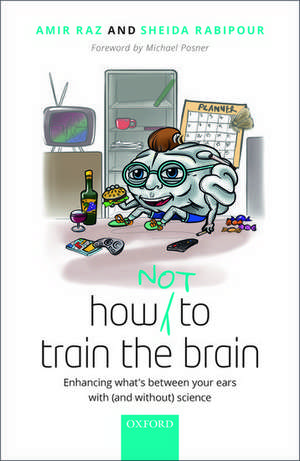How (not) to train the brain: Enhancing what's between your ears with (and without) science
Autor Amir Raz, Sheida Rabipouren Limba Engleză Hardback – 18 apr 2019
Preț: 303.64 lei
Preț vechi: 342.38 lei
-11% Nou
Puncte Express: 455
Preț estimativ în valută:
58.11€ • 59.95$ • 49.18£
58.11€ • 59.95$ • 49.18£
Carte tipărită la comandă
Livrare economică 22-28 februarie
Preluare comenzi: 021 569.72.76
Specificații
ISBN-13: 9780198789673
ISBN-10: 019878967X
Pagini: 372
Dimensiuni: 146 x 134 x 18 mm
Greutate: 0.62 kg
Editura: OUP OXFORD
Colecția OUP Oxford
Locul publicării:Oxford, United Kingdom
ISBN-10: 019878967X
Pagini: 372
Dimensiuni: 146 x 134 x 18 mm
Greutate: 0.62 kg
Editura: OUP OXFORD
Colecția OUP Oxford
Locul publicării:Oxford, United Kingdom
Recenzii
How (Not) to Train the Brain fills a gap in the popular literature on a timely and controversial issue, and would be of great interest to anyone invested in the topic.Recommended. All readers.
The mind is fascinating, and I appreciate authors such as these who challenge the status quo and share innovative, thought-provoking ideas. This is a great resource that readers can use to make their own informed decisions about brain training programs.Weighted Numerical Score: 95 - 4 Stars!
This illuminating and informative book shows the complexities and debates regarding brain training, with engaging examples and current evidence, and also outlines the next frontier in brain training.
I thoroughly enjoyed reading 'How (not) to Train the Brain'. The nuanced approach to describing the brain-training literature brought a smile to my face.
This book introduces a much-needed scientific framework to a field replete with pseudo-scientific claims and promises
Are you looking for a rigorous answer to the question of whether brain training works? In this book, you will find a nicely-written, clever, and bal-anced analysis of the science behind brain training.
This book does an outstanding job in reviewing the many issues involved when it comes to brain training... It was a pleasure in reading this volume to see new ideas build on older ones...
The mind is fascinating, and I appreciate authors such as these who challenge the status quo and share innovative, thought-provoking ideas. This is a great resource that readers can use to make their own informed decisions about brain training programs.Weighted Numerical Score: 95 - 4 Stars!
This illuminating and informative book shows the complexities and debates regarding brain training, with engaging examples and current evidence, and also outlines the next frontier in brain training.
I thoroughly enjoyed reading 'How (not) to Train the Brain'. The nuanced approach to describing the brain-training literature brought a smile to my face.
This book introduces a much-needed scientific framework to a field replete with pseudo-scientific claims and promises
Are you looking for a rigorous answer to the question of whether brain training works? In this book, you will find a nicely-written, clever, and bal-anced analysis of the science behind brain training.
This book does an outstanding job in reviewing the many issues involved when it comes to brain training... It was a pleasure in reading this volume to see new ideas build on older ones...
Notă biografică
Professor Raz earned his Ph.D. in Brain Science from the Interdisciplinary Center for Computational Neuroscience at the Hebrew University of Jerusalem under the supervision of the late Professor Shlomo Bentin. He then went on to a post-doctoral fellowship with Professor Michael Posner at the Weill Medical College of Cornell University, where he took on a faculty position thereafter. He then joined the faculty at Columbia University in the City of New York and later became the Canada Research Chair at McGill University in Montreal, Canada.Sheida received her Bachelor and Master of Science degrees from McGill University, and her PhD in Psychology from the University of Ottawa, in Canada. Her research centres on cognitive enhancement interventions that may help understand and optimize brain function throughout life. Sheida is also passionate about science communication and community outreach. She frequently partakes in knowledge translation activities targeting broad audiences, and has founded initiatives to engage the public in learning about brain function and mental health. Sheida has published her research in academic journals and presented her work in national and international conferences. Her research and outreach activities have earned her numerous awards, honours, and scholarships from national and international organizations.
